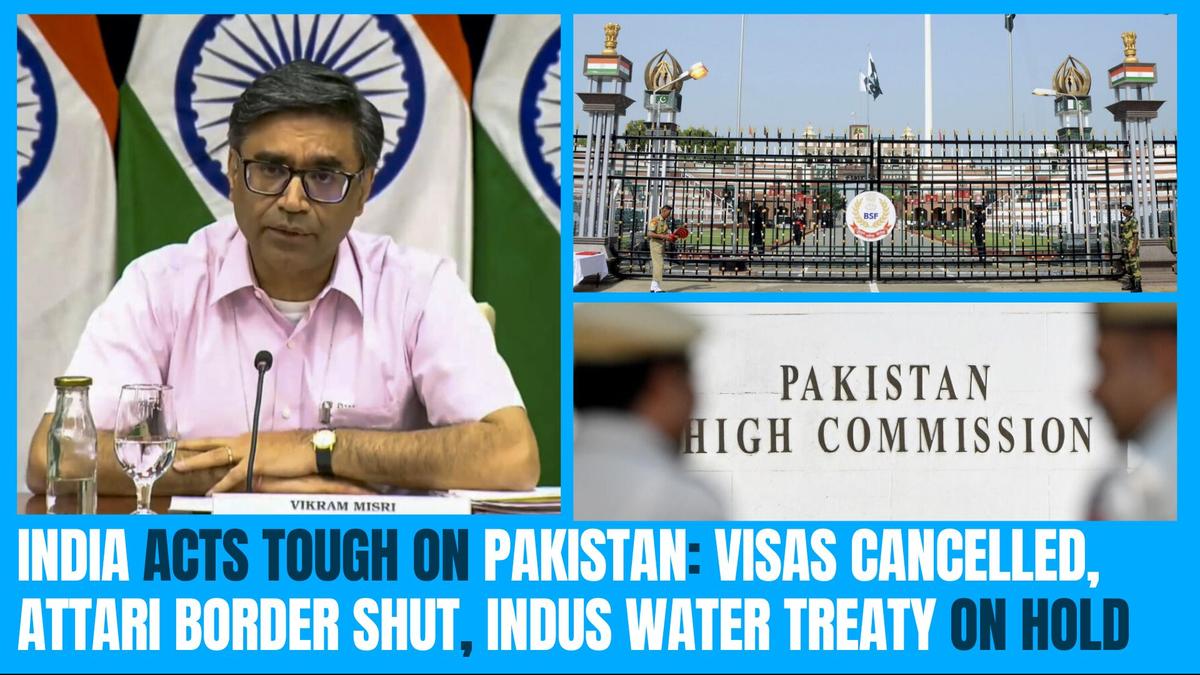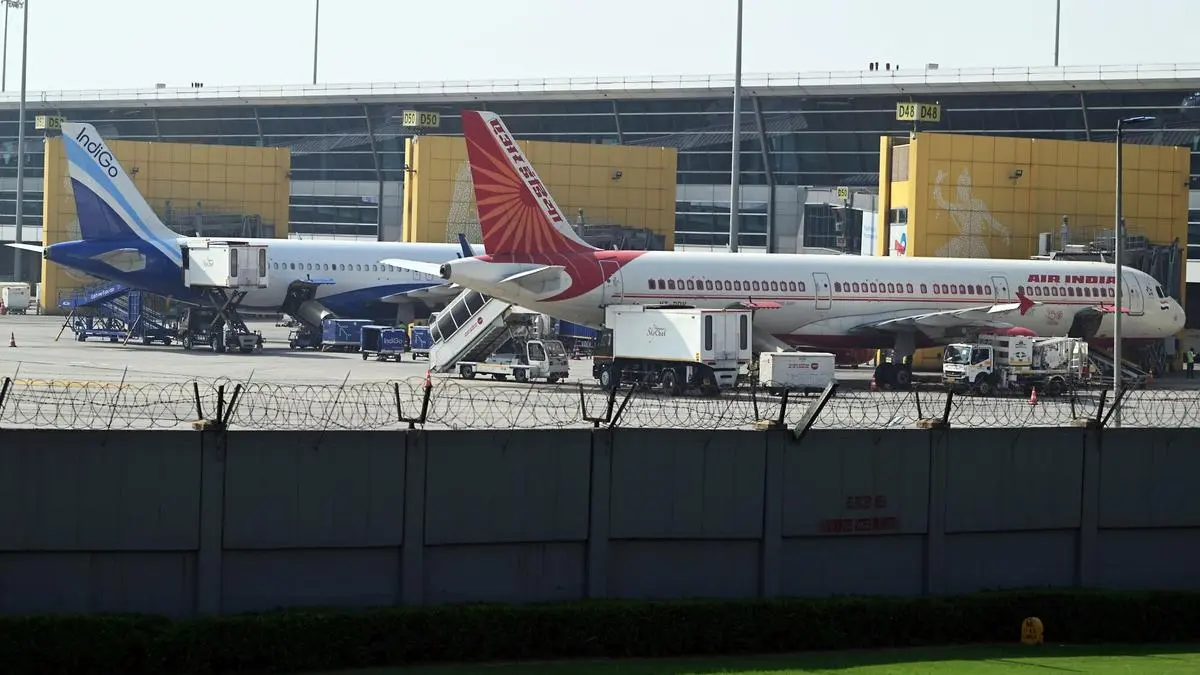Business
Pahalgam fallout: Pakistan airspace closure to hurt India-based airlines

The longer flight durations, higher fuel burn, and restricted capacity in 2019 had led to massive losses for the airline industry.
More Like This
“Air India regrets the inconvenience caused to our passengers due to this unforeseen airspace closure that is outside our control,” Air India said on social media platform X (formerly Twitter).


However, the situation is not unprecedented, as airlines had a similar experience in the aftermath of the Balakot air strikes by the Indian Air Force in 2019.Air India said that some of its flights to or from North America, the UK, Europe, and the Middle East will take an alternative extended route.Speaking to businessline, industry insiders have estimated a rise in airfares and losses for India-based airlines.Apart from alternative routes, technical stops at Sharjah in the UAE and Vienna in Austria were created for operations from India.“Some US-bound flights may see additional fuel stops and extended travel times, pushing up operational expenses considerably.”“Air India regrets the inconvenience caused to our passengers due to this unforeseen airspace closure that is outside our control,” Air India said on social media platform X (formerly Twitter).Pakistan’s decision to close its airspace to Indian-based airlines is expected to deal a financial as well as operational blow to the sector.According to aviation industry veteran Manoj Chacko, other routes that do not depend on Pakistan’s airspace can be used by India-based airlines for international journeys.Especially hard-hit were large international fleet operators, like Air India, which was government-owned at the time and lost nearly ₹6 crore a day.Published on April 24, 2025
More Like This
However, airline representatives, along with MoCA (Ministry of Civil Aviation) officials, seem confident that the lessons learned from the 2019 episode will keep the industry in “good stead.”
Business
India downgrades diplomatic ties with Pakistan

India on Wednesday suspended the Indus Water Treaty and announced downgrading diplomatic ties with Pakistan including expulsion of its military attaches in view of cross-border links to the Pahalgam terror attack.The CCS decided that the Indus Waters Treaty of 1960 will be held in abeyance with immediate effect, until Pakistan credibly and irrevocably abjures its support for cross-border terrorism, Foreign Secretary Vikram Misri said at a media briefing.The Integrated Check Post at Attari will be closed with immediate effect, he said.Published on April 23, 2025 Those who have crossed over with valid endorsements may return through that route before May 1, he said.The Cabinet Committee on Security (CCS) met this evening under the chairmanship of Prime Minister Narendra Modi and firmed up the responses to the terror attack.


The Integrated Check Post at Attari will be closed with immediate effect, he said.Published on April 23, 2025 The CCS decided that the Indus Waters Treaty of 1960 will be held in abeyance with immediate effect, until Pakistan credibly and irrevocably abjures its support for cross-border terrorism, Foreign Secretary Vikram Misri said at a media briefing.Those who have crossed over with valid endorsements may return through that route before May 1, he said.India on Wednesday suspended the Indus Water Treaty and announced downgrading diplomatic ties with Pakistan including expulsion of its military attaches in view of cross-border links to the Pahalgam terror attack.The Cabinet Committee on Security (CCS) met this evening under the chairmanship of Prime Minister Narendra Modi and firmed up the responses to the terror attack.
Business
Renault opens new car design centre in Chennai

Laurens van den Acker, Chief Design Officer, Renault Group and M Venkatram, Country CEO and MD, Renault India at the unveiling of a sculpture model designed by the Renault Design team, at the Renault Nissan Technology & Business Centre at Mahindra City, near Chennai
| Photo Credit:
BIJOY GHOSH


The company’s design journey in India began with studios in Pune and Mumbai, which have now been consolidated into the new state-of-the-art Chennai facility.Renault already operates one of its largest global R&D centers in Chennai, with nearly 10,000 engineers contributing to both local and international projects. The company also actively exports made-in-India components for use in vehicles manufactured around the world.Published on April 22, 2025 “India is a unique and complex market shaped by local consumer preferences. Establishing a dedicated design studio here is essential to truly understand these dynamics and create relevant solutions,” said Laurens van den Acker, Chief Design Officer, Renault Group. “The Chennai studio will not only focus on India-specific concepts and models but will also contribute to global projects under the Renault Group umbrella.”French automaker Renault has unveiled what it calls its largest design facility outside France, the Renault Design Centre Chennai (RDCC), located within the Renault Nissan Technology & Business Centre India campus at Mahindra City, near Chennai.This new facility will be responsible for designing all five upcoming Renault models set to launch in India over the next two years. The studio currently employs over 30 design professionals.“We are proud to be the most Indian of European carmakers,” Venkatram Mamillapalle, Country CEO and Managing Director of Renault India Operations, said. “From our extensive R&D center to a robust manufacturing footprint and a deeply localized supply chain, Renault has built strong roots in India. The new Chennai design centre adds yet another dimension to this foundation, positioning us to take forward the Renault International Game Plan 2027.”“We are expanding our Indian design team and collaborating closely with stakeholders across the country’s automotive ecosystem,” van den Acker added. “This enables us to deliver products that resonate deeply with Indian consumers while strengthening Renault’s global innovation pipeline.”
Business
R&D services for cancer diagnosis does not qualify for GST exemption as ‘healthcare services’, says Maha AAR

According to Sandeep Sehgal, Partner at AKM Global, the said ruling highlights a crucial distinction between approved healthcare diagnostics and new, tech-driven testing methods. It clearly states that not all laboratory tests are automatically exempt from GST. If a test is still in the experimental stage and lacks approvals from regulatory bodies like ICMR or CDSCO, it will be treated as research and subject to GST. This is a key takeaway for diagnostic start-ups and labs using advanced technologies like genome sequencing or AI-based testing. Therefore, “to qualify for GST exemption under healthcare services, obtaining proper medical licenses and regulatory approvals is essential,” he said.Published on April 21, 2025 “The primary activity is research and experimental development of Cancer Prognostic and Diagnostic Technologies,” MAAR said while ruling that it is not eligible for the benefit of exemption. The quails judicial body observed that diagnostic test is still in its developmental stage and is not yet validated by the medical regulatory bodies. It noticed that applicant has not produced any license or certificate from Central Drugs Standard Control Organisation or any approval from Indian Council for Medical Research . It also said: “Tests cannot be treated as a proper diagnostic test but is more in the nature of clinical research and development and as a result it does not qualify as a Health Care Service.”Epigeneres Biotech Private Ltd had moved MAAR seeking advance ruling on whether the provision of diagnostic services would qualify for exemption from GST. Diagnostic services for conducting blood tests which assists in early detection of cancer fall out of the periphery of ‘Healthcare services’, Maharashtra’s Authority for Advance Ruling (MAAR) has ruled. This means such a service will not be exempted from GST.


“The primary activity is research and experimental development of Cancer Prognostic and Diagnostic Technologies,” MAAR said while ruling that it is not eligible for the benefit of exemption. The quails judicial body observed that diagnostic test is still in its developmental stage and is not yet validated by the medical regulatory bodies. It noticed that applicant has not produced any license or certificate from Central Drugs Standard Control Organisation or any approval from Indian Council for Medical Research . It also said: “Tests cannot be treated as a proper diagnostic test but is more in the nature of clinical research and development and as a result it does not qualify as a Health Care Service.”This is a key takeaway for diagnostic start-ups and labs using advanced technologies like genome sequencing or AI-based testing. Therefore, “to qualify for GST exemption under healthcare services, obtaining proper medical licenses and regulatory approvals is essential,” he said.According to Sandeep Sehgal, Partner at AKM Global, the said ruling highlights a crucial distinction between approved healthcare diagnostics and new, tech-driven testing methods. It clearly states that not all laboratory tests are automatically exempt from GST. If a test is still in the experimental stage and lacks approvals from regulatory bodies like ICMR or CDSCO, it will be treated as research and subject to GST. Epigeneres Biotech Private Ltd had moved MAAR seeking advance ruling on whether the provision of diagnostic services would qualify for exemption from GST. Diagnostic services for conducting blood tests which assists in early detection of cancer fall out of the periphery of ‘Healthcare services’, Maharashtra’s Authority for Advance Ruling (MAAR) has ruled. This means such a service will not be exempted from GST.Published on April 21, 2025
-

 india2 years ago
india2 years ago“Major Crash of Sukhoi Su-30 and Mirage 2000 Fighter Jets in Madhya Pradesh”
-

 Sports2 years ago
Sports2 years agoWFI meetings on April 16, elections likely to be discussed
-

 india1 year ago
india1 year agoPM Modi Meets Deve Gowda for Seat Sharing Talks
-

 india1 year ago
india1 year agoBengaluru: False threat to bomb Raj Bhavan
-

 india2 years ago
india2 years ago“AIMIM to Contest 50 Seats in Upcoming Telangana Assembly Elections”
-

 Entertainment1 year ago
Entertainment1 year agoAnant Ambani: Controversy at the Ambani Pre-Wedding Bash
-

 Karnataka2 years ago
Karnataka2 years agoWomen have to show their Aadhaar to travel free on KSRTC bus
-

 Entertainment2 years ago
Entertainment2 years agoRajinikanth is Moideen Bhai in ‘Lal Salaam’
















